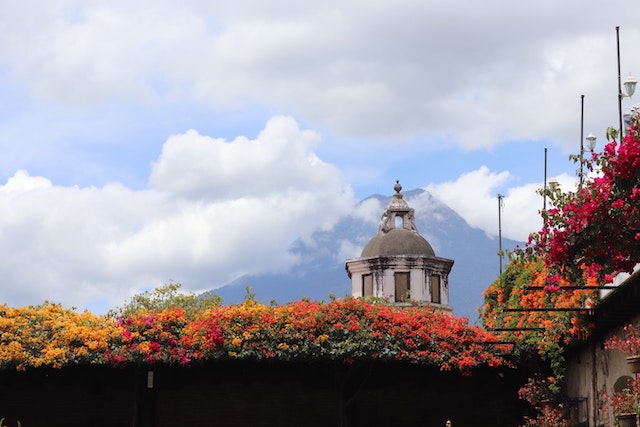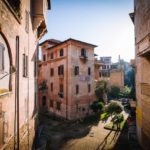Capturing the Life of a Young Guatemalan Woman on Camera

When I stepped off the bus, the soles of my sneakers scraped against the moist concrete. The sky was dark, as the sun had yet to rise, and unseen clouds loomed overhead. The air was cool yet heavy.
I wrapped my thin jacket tighter around my body and wished that I had packed a warmer sweatshirt, and that I would have known that I would be spending several early mornings battling the chill of Central America’s rainy season. I had not expected this, just as I had not expected that morning, when I begrudgingly rolled out of my hostel bed at four o’clock, would lead to one of the most memorable and meaningful days of my life.
As the cinematographer, I felt anxious to be entering her home with cameras and microphones, nervous as to how her family would react.
When I arrived in Quetzaltenango, Guatemala to spend a month filming a short documentary with Actuality Media, I had no idea what to expect. The farthest I had ever wandered away from where I was raised in Western New York had been to the coasts of California or Florida. Yet there I was, spending a month in a foreign developing country, attempting to assimilate into a culture I knew close to nothing about.
I felt comforted by the group of 11 other filmmakers with whom I traveled, all coming from Westernized countries and even some with comparatively limited travel experience. However, the moments when I was displaced from the surroundings and company I was most accustomed to, such as that morning, are the ones I remember most.
It was a day that had been scheduled and re-scheduled; cancelled due to rain, then followed through with out of our need to fulfill an obligation. It was our last day with time allotted for gathering footage, and the only afternoon in which we were able to get shots of Cecilia, a 19-year-old Guatemalan woman, and the subject of our film, at home with her family.
As the cinematographer, I felt anxious to be entering her home with cameras and microphones, nervous as to how her family would react. The goal was to capture them in their most comfortable environment, but people are often unnerved by the presence of a camera. I was accustomed to overcoming this hurdle, but had never before had the added barrier of varying languages and cultures.
Capturing the Life of a Young Guatemalan Woman on Camera.
So I worried, would they be shy? Uncomfortable? Unwilling for their peaceful hillside home to be put on display? These questions raced through my mind as we met up with Cecilia, who had awoken before dawn to take us to her favorite spot to watch the sunrise.
While I wandered the rural, mountainous town of Cantel with the film’s director, producer, translator and, of course camera, we parted ways with Cecilia for a few hours’ time. We needed to start establishing shots, to get a good feel for the community we were attempting to portray, and it was, after all, barely sunrise.
Under the impression that she would be returning to bed, we continued exploring the town by foot, returning to her home well after morning church bells had rung. However, when we stepped through the floral archway and crossed the threshold into Ceclia’s home, we quickly learned that she had not spent the last several hours catching up on sleep as I had expected. Instead, we were welcomed by a delicious homemade breakfast and, ultimately, humbled by Cecilia and her mother’s hospitality.
They brought out a table for us to eat on, covering it carefully with a tablecloth. Bowls carrying various dishes were then laid upon it, a sea of homemade tortillas and eggs suddenly before us. Throughout the day they fed us multiple meals, introducing us to Guatemalan specialties such as tamales and the absolute sweetest coffee I have ever tasted.
Capturing the Life of a Young Guatemalan Woman on Camera.
I had been so pleasantly surprised by the family’s interest in our film, and their willingness to allow the details of their daily lives to be captured by a camera. When Cecilia’s father arrived home from his day of work, we took another break from shooting b-roll to sit and talk. He had thanked us profusely for expressing such fondness towards his daughter, welcoming and regarding us with such genuine warmth. He confessed that we were the first international individuals to ever visit their home, just as it was my first time being a personal guest in a country outside of my own. It was incredible to witness individuals of different cultures colliding so personally for the first time, each so interested in one another, and to talk, not as filmmakers and subjects, but as humans.
Cecilia asked if any of us were married, questioned if we lived with our families or on our own. We bonded over her favorite movie, The Fault in Our Stars, which is a film that had reduced us both to tears. We accompanied her and her best friend to a fair, encouraging each other to ride a rather fast-paced ferris wheel, then laughing together when nobody would.
It was incredible to witness individuals of different cultures colliding so personally for the first time, each so interested in one another, and to talk, not as filmmakers and subjects, but as humans.
Although the day was sprinkled with many happy, lighthearted moments such as these, which remain some of my fondest memories, there was also a rather serious overtone to the visit. Our purpose was to share Cecilia’s story, which includes both the good and bad, the struggle and the solution.
I experienced a lot in my one-month stay in Guatemala, including erupting volcanoes, natural hot springs and even the peak of Volcan Tajumulco, the highest in Central America. But the conversations, the interactions, the people whose stories I have heard and shared, whose extreme hospitality I have been greatly humbled by, is what has left the most lasting impact on me.
Photo credit by Unsplash.








